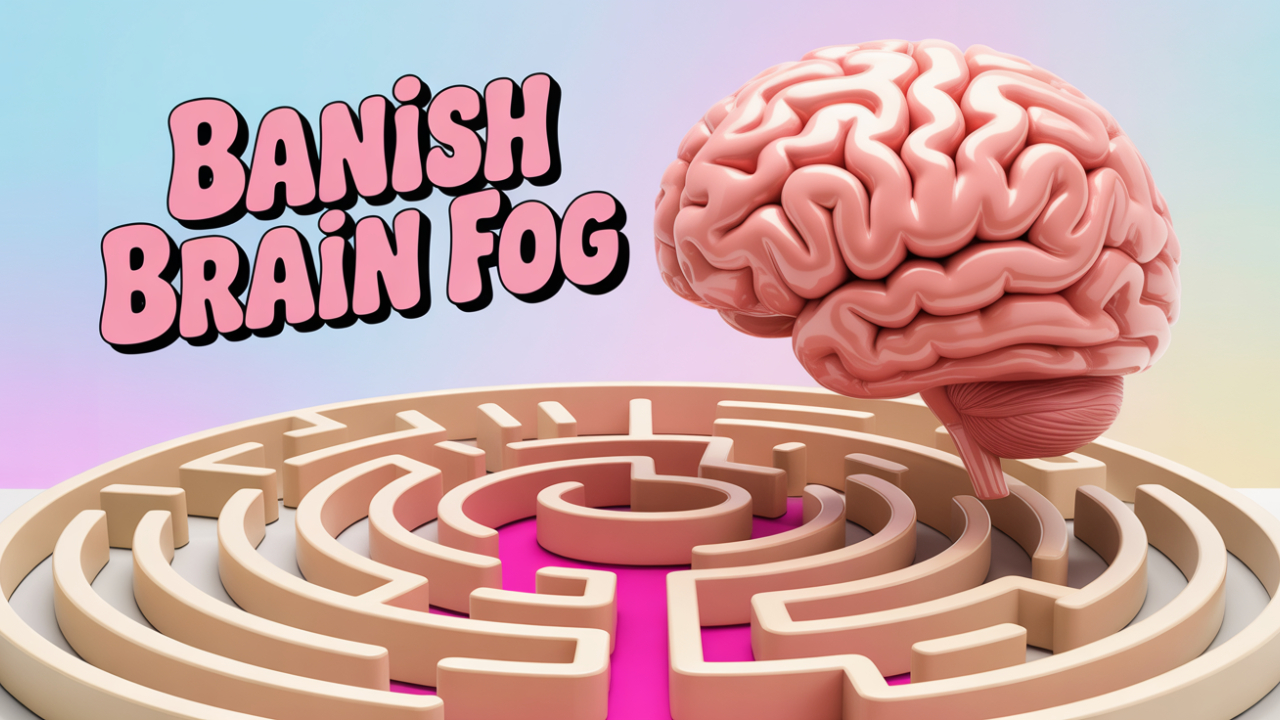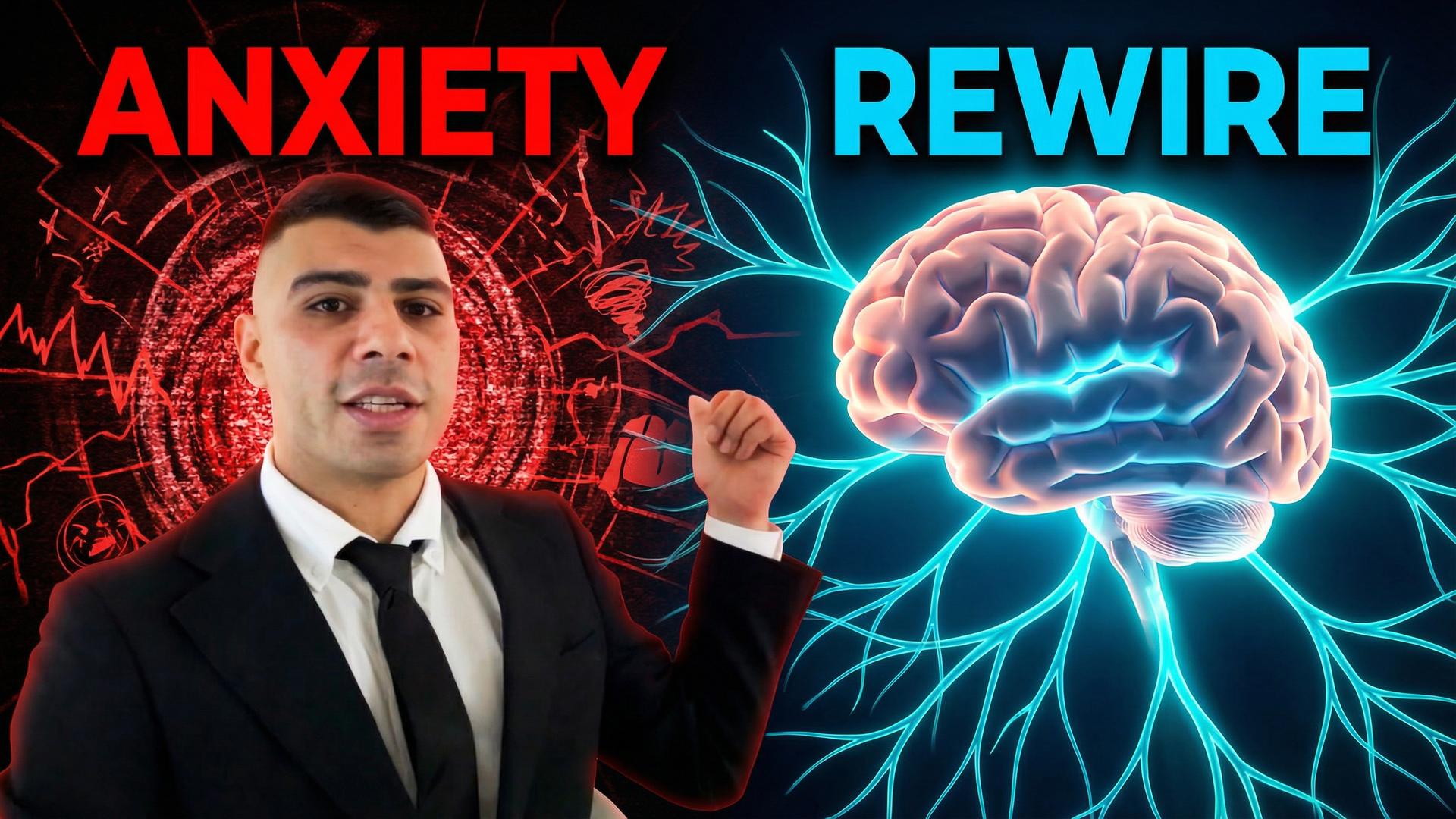Can’t you focus? Do you ever feel like you’re moving through life in a thick fog? You’re sitting at your desk, you know exactly what you need to do, but your brain just refuses to cooperate. You read the same email three times over, forget why you even walked into a room, and you can’t seem to fo
cus on a conversation that’s happening right in front of you. It can feel like your mind is wading through mud.
It’s a frustrating and disorienting experience that can leave you feeling lazy, incompetent, and just… stuck. Maybe you lose your train of thought mid-sentence, find it impossible to follow instructions, or just feel tired and confused all the time.
If any of that sounds familiar, you’re not alone, and it’s not your fault. You’re experiencing what’s known as “brain fog.” This isn’t a personal failing or a lack of willpower; it’s a real, physical state that happens when something in your body and brain is out of balance. It’s a symptom, not a disease, and that mental haze clouding your thoughts has real, scientific causes.
More importantly, we’re going to give you a science-backed toolkit of real strategies you can use to finally cut through that fog, reclaim your mental clarity, and get your sharp, focused mind back. We’re going to go beyond the usual advice so you understand not just *what* to do, but *why* it actually works.

Section 1: The “Why” – Unmasking the Causes of Brain Fog and Focus
To really fix brain fog, we have to understand where it comes from. It isn’t just one thing, but the result of a few different disruptions in your body. Think of it like the “check engine” light in your car—it doesn’t tell you the exact problem, but it’s a clear signal that something needs your attention. The common thread connecting most causes of brain fog is that they throw off the delicate chemical balance your brain needs to be at its best. Let’s explore the main culprits.
Cause #1: Your Brain on Fire – The Inflammation Connection of focus
One of the biggest, and most overlooked, drivers of brain fog is chronic inflammation. Now, when you hear “inflammation,” you probably picture a swollen ankle. That’s *acute* inflammation—your body’s healthy, short-term response to an injury. Chronic inflammation is a different beast entirely. It’s a low-grade, simmering fire throughout your body that can last for months or years, often fueled by things like a poor diet, stress, and a lack of sleep.
So how does that body-wide fire lead to a foggy brain? It has to do with a protective shield called the blood-brain barrier. This barrier acts like a bouncer for your brain, letting good stuff in and keeping bad stuff out. But chronic inflammation can make this barrier “leaky.” When that happens, inflammatory molecules called cytokines, which are floating around in your body, can sneak into the brain.
Once inside, these cytokines rile up the brain’s own immune cells, called microglia. Normally, microglia are just housekeepers, but when they’re constantly activated by inflammation, they go on the attack, releasing chemicals that disrupt communication between your brain cells. This “neuroinflammation” makes it harder for your brain to form new connections, learn, and just perform its daily tasks. Essentially, your brain is trying to work in a hostile environment, and brain fog is what you feel as a result.
Cause #2: The Cortisol Cascade – How Stress Scrambles Your Circuits and focus
For many of us, chronic stress has become the new normal. While the “fight-or-flight” response is great for escaping immediate danger, our bodies aren’t built for the non-stop psychological stress of deadlines, traffic, and endless notifications. This constant triggering of our stress system has a major impact on the brain.
When you feel stressed, a system called the HPA axis tells your adrenal glands to release a flood of hormones, especially cortisol. In short bursts, cortisol is great—it sharpens your focus and gives you energy. The trouble starts when the stress never lets up, and you’re exposed to high levels of cortisol all the time.
High cortisol can wreak havoc on the parts of your brain in charge of memory and focus. The hippocampus, which is critical for learning and creating new memories, is especially vulnerable. It’s loaded with cortisol receptors, and being exposed to too much of it can actually cause the hippocampus to shrink, making it harder to learn and remember things.
At the same time, your prefrontal cortex—your brain’s CEO for decision-making and focus—gets weaker. Meanwhile, the amygdala, your brain’s fear center, becomes overactive, leaving you feeling anxious and on edge. This creates a vicious cycle: stress makes your brain less focused and more reactive, which in turn makes you feel even more stressed. All of this hormonal chaos is a perfect recipe for brain fog.
Cause #3: The Sleep Deficit – Your Brain’s Nightly Cleanup Crew on Strike
Sleep isn’t a luxury; it’s a fundamental biological need. We often try to cheat it, but skimping on sleep has immediate consequences for your brain, and brain fog is one of the first things you’ll notice.
Two really important things happen when you sleep that help you think clearly. The first is memory consolidation. While you sleep, your brain is busy sorting and filing the day’s information, moving memories from short-term to long-term storage. This clears out your hippocampus, getting it ready for the next day. If you don’t get enough quality sleep, this process gets cut short. Your hippocampus stays “full,” making it tough to learn or concentrate.
The second process is even more fascinating. It involves the brain’s waste-clearance system, called the glymphatic system. Think of it as the brain’s sanitation crew that only works the night shift. During deep sleep, the spaces between your brain cells actually get bigger, allowing fluid to flush through and clear out all the metabolic junk that builds up while you’re awake.
When you’re sleep-deprived, that cleanup crew can’t do its job. All that metabolic trash starts to pile up, interfering with how your brain cells talk to each other and directly contributing to that sluggish, foggy feeling. On top of that, a bad night’s sleep messes with your stress hormones, leading to higher cortisol the next day, which just feeds the cycle of stress, bad sleep, and more brain fog.
Cause #4: The Energy Crisis – Fuel, Nutrients, and the Gut-Brain Connection for focus
Your brain is an energy hog. It takes up only 2% of your body’s weight but uses about 20% of its energy. To work well, it needs a steady supply of fuel and a lot of different nutrients. If that supply chain gets disrupted, brain fog is almost guaranteed.
First, let’s talk about fuel. Your brain runs on glucose, but the *stability* of that fuel is what really matters. A diet high in sugar and processed foods sends your blood sugar on a rollercoaster. You get a quick burst of energy, but the crash that follows leaves your brain starved for fuel, leading to that classic mid-afternoon fog where you can’t focus on anything.
Beyond just fuel, your brain needs specific nutrients to build messengers, protect itself, and communicate. Running low on certain vitamins and minerals is also strongly linked to brain fog.
– **B Vitamins:** B12, in particular, is essential for healthy nerve function. A deficiency can contribute to memory issues and mental slowness.
– **Vitamin D:** Sometimes called the “sunshine vitamin,” it’s important for mood and cognitive function. Low levels are associated with fatigue and trouble concentrating.
– **Iron:** Iron helps carry oxygen in your blood. When it’s low, your brain might not get the oxygen it needs to work properly, leading to fogginess and fatigue.
– **Omega-3 Fatty Acids:** These healthy fats are building blocks for your brain cells and have powerful anti-inflammatory effects. A diet lacking in omega-3s can impair brain function.
Finally, you can’t talk about brain nutrition without talking about your gut. Your gut is often called the “second brain” for good reason—it’s in constant communication with your actual brain. The trillions of bacteria in your gut—your microbiome—play a huge role in this chat. They help produce neurotransmitters like serotonin, regulate inflammation, and digest your food. In fact, about 90% of your body’s serotonin is made in your gut.
When your gut microbiome is out of balance—a state called dysbiosis—it can trigger body-wide inflammation and send distress signals to your brain, directly contributing to brain fog, anxiety, and depression. The health of your gut is directly tied to the clarity of your mind.
Cause #5: The Blood Flow Bottleneck – Insufficient Cerebral Circulation
Your brain depends on a constant, steady flow of blood to deliver the oxygen and nutrients it needs. Blood flow to the brain is so critical that even small disruptions can have a noticeable effect on your thinking. When that flow is slowed down, it can lead to brain fog, fatigue, and difficulty concentrating.
A sedentary lifestyle is a major contributor. Regular exercise gets your heart pumping and promotes great circulation everywhere, including your brain. When you’re inactive for long stretches, that circulation can become sluggish.
Certain medical conditions can also reduce blood flow to the brain. For example, in Postural Orthostatic Tachycardia Syndrome (POTS), standing up can cause a drop in blood flow to the brain, which is a major cause of the brain fog many patients experience. Similarly, research suggests that people with Chronic Fatigue Syndrome (CFS) may experience reduced blood flow to the brain, which is thought to be a key reason for their cognitive struggles.
Even something as simple as dehydration can have an impact. Your blood is mostly water, so when you’re dehydrated, your blood volume drops. This makes your blood thicker and harder to pump, which can reduce the flow of oxygen to your brain and leave you feeling foggy.
Cause #6: When It’s More Than Lifestyle – Underlying Medical Conditions
While lifestyle factors are the most common culprits, it’s really important to know that persistent brain fog can also be a major symptom of an underlying medical condition. In these cases, the fog is a signal that something deeper is going on.
**Hormonal Imbalances:** Changes in your body’s chemical messengers can throw your thinking for a loop.
– **Menopause and Perimenopause:** The drop in estrogen during this transition is famously linked to brain fog, memory trouble, and issues with focus.
– **Thyroid Issues:** An underactive thyroid (hypothyroidism) slows down your whole body, including your thinking, leading to fatigue and brain fog.
**Autoimmune Conditions:** In diseases like Multiple Sclerosis (MS), Lupus, and Rheumatoid Arthritis, the immune system mistakenly attacks the body, creating constant inflammation that can directly affect the brain and nervous system. Brain fog is an almost universal complaint for people with these conditions.
**Chronic Fatigue Syndrome (ME/CFS) and Fibromyalgia:** These complex illnesses are known for causing debilitating fatigue, pain, and severe cognitive impairment, often called “fibro fog.” The causes are still being researched but are thought to involve neuroinflammation and impaired blood flow to the brain.
**Post-Viral Syndromes:** As many people have learned from COVID-19, viral infections can have lasting effects. “Long COVID” often include persistent and severe brain fog as a primary symptom, which researchers think could be due to a leaky blood-brain barrier and lingering inflammation.
If your brain fog is severe, won’t go away, and doesn’t get better with lifestyle changes, it is essential to see a doctor. They can run tests to check for these and other potential causes so you can get the right treatment.
Section 2: The “How” – Your Actionable Toolkit for Mental Clarity
Now that we know *why* brain fog happens, let’s get to the most important part: *how* to fix it. The great news is that because brain fog has real, physical causes, we can use real, science-backed solutions to address it. Clearing the fog doesn’t mean you have to overhaul your entire life overnight. It’s about making small, smart changes that target the root causes we’ve just talked about. Here’s your toolkit for getting your focus back.
Solution #1: The Hydration Reset – The Simplest Brain Boost
This is the simplest, cheapest, and often most surprisingly effective place to start. Your brain is about 75% water, and even being mildly dehydrated can mess with your focus and energy. When you’re dehydrated, your blood volume decreases, which means less oxygen and nutrients get delivered to your brain.
Actionable Steps:
– **Start Your Day with Water:** Before you even think about coffee, drink a big glass of water. You wake up dehydrated, and starting your day with water can set you up for better clarity all day long.
– **Carry a Water Bottle:** The easiest way to drink more water is to have it with you. Keep a reusable bottle on your desk, in your bag, or in your car.
– **Drink Enough for *You*:** A common goal is about 8 glasses a day, but your needs will vary. A better guide is to drink enough so that your urine is a pale yellow color.
– **Eat Your Water:** Many fruits and vegetables are packed with water. Cucumbers, watermelon, strawberries, and celery are all great for hydration.
– **Listen to Your Thirst:** Thirst is actually a late signal that you’re already dehydrated. If you feel thirsty, drink up!
Making this one simple change can lead to noticeable improvements in your mental sharpness in just a few days.
Solution #2: Master Your Sleep – Reboot Your Brain’s Operating System
If inflammation is the fire and stress is the gas pedal, poor sleep is the gasoline poured all over everything. We already know sleep is non-negotiable for clearing waste and consolidating memories. Making good sleep a priority is one of the most powerful things you can do to fight brain fog. This isn’t just about being in bed longer; it’s about improving the *quality* of your sleep.
Actionable Steps:
– **Stick to a Schedule:** Go to bed and wake up around the same time every day, even on weekends. This helps regulate your body’s internal clock, which controls your sleep-wake cycle.
– **Create a Wind-Down Routine:** For the hour before bed, signal to your brain that it’s time to rest. Turn off screens—the blue light messes with your sleep hormone, melatonin—dim the lights, and do something relaxing.
– **Optimize Your Bedroom:** Your bedroom should be a sanctuary for sleep. Keep it **cool, dark, and quiet.** Blackout curtains, a white noise machine, or an eye mask can make a huge difference.
– **Watch What You Consume:** Stop drinking caffeine at least 8 hours before bed. Avoid big meals or too much alcohol at night. Alcohol might make you feel drowsy, but it wrecks your sleep quality later on.
– **Get Morning Sunlight:** Try to get 10-15 minutes of natural sunlight shortly after you wake up. This helps lock in your circadian rhythm and tells your brain when to be alert, which actually helps you sleep better at night.
Solution #3: The Anti-Inflammatory Plate – Eating for Clarity
The food you eat has a direct and powerful effect on inflammation levels in your body and brain. An anti-inflammatory diet isn’t about restriction; it’s about filling your plate with nutrient-packed whole foods that fight inflammation and give your brain the building blocks it needs. The MIND diet, which is a mix of the Mediterranean and DASH diets, is specifically designed to support brain health.
Actionable Steps:
– **Eat a Rainbow of Plants:** Aim for a wide variety of colorful fruits and vegetables. They’re loaded with antioxidants that fight inflammation. Leafy greens like spinach and kale, and berries like blueberries, are especially great for your brain.
– **Focus on Healthy Fats:** Omega-3 fatty acids are key to reducing brain inflammation. You can find them in fatty fish like salmon and sardines, as well as in walnuts, flaxseeds, and chia seeds. Use extra virgin olive oil as your main cooking oil.
– **Choose Whole Grains:** Swap white bread and pasta for oats, quinoa, and brown rice. They provide a steady supply of energy for your brain and are rich in B vitamins.
– **Lean on Good Protein:** Include lean poultry, fish, and especially beans and lentils in your diet. Legumes are also packed with fiber, which is crucial for a healthy gut.
– **Cut Back on Inflammatory Foods:** This is just as important as what you add. Try to minimize ultra-processed foods, sugary drinks, and unhealthy fats found in processed meats and fried foods. These are major drivers of inflammation.
Solution #4: Tame the Stress Tiger – Regaining Control of Cortisol
You can’t get rid of all the stress in your life, but you can change how your body reacts to it. The goal is to build practices into your day that actively calm your nervous system, pulling you out of that chronic “fight-or-flight” state and lowering the damaging effects of too much cortisol.
Actionable Steps:
– **Try Mindfulness or Meditation:** Even just 5-10 minutes a day can make a difference. Meditation has been shown to calm the brain’s overactive fear center and improve focus. There are great apps like Headspace and Calm, or you can find free guided meditations on YouTube.
– **Use Your Breath:** When you feel stressed or foggy, use deep belly breathing to instantly calm your system. A simple technique is “box breathing”: inhale for a count of 4, hold for 4, exhale for 4, and hold for 4. Repeat this for a few minutes. Deep breathing exercises are a powerful way to increase oxygen flow to the brain.
– **Schedule “Worry Time”:** If you’re a chronic worrier, set aside 15 minutes each day to just let yourself worry. When anxious thoughts pop up outside that window, gently remind yourself that you’ll deal with them later. This can help contain the mental chatter that drains your energy.
– **Get Outside:** Spending time in nature, even just a short walk in a park, can lower cortisol levels and improve your focus.
Solution #5: The 20-Minute Focus Walk – Move Your Body, Clear Your Mind
Physical exercise is one of the best brain boosters there is. It fights brain fog on multiple fronts: it improves blood flow to the brain, reduces inflammation, lowers stress, and triggers the release of something called BDNF, or Brain-Derived Neurotrophic Factor. BDNF is like “Miracle-Gro for your brain”—it helps grow new brain cells and is vital for learning and memory.
Actionable Steps:
– **Schedule a Daily Walk:** You don’t have to run a marathon. A brisk 20-30 minute walk can be incredibly effective. Research even shows the impact of your feet hitting the ground sends pressure waves through your arteries that can increase blood flow to your brain.
– **Find an Activity You Enjoy:** The best exercise is the one you’ll actually do. Whether it’s dancing, swimming, or cycling, find something you genuinely like.
– **Use Movement to Reset:** When you feel really foggy and stuck, one of the best things you can do is step away from your desk and move. A short burst of activity, like some jumping jacks or a quick walk up the stairs, can be enough to reset your brain and help you come back with more clarity.
– **Mix It Up:** For the best brain benefits, try to combine cardio exercise with strength training. Cardio is great for blood flow, while strength training helps your body use energy more efficiently, which also benefits the brain.
Solution #6: Strategic Supplementation & Knowing When to Seek Help
While a good diet should always come first, sometimes supplements can help fill in the gaps, especially if you have a diagnosed deficiency. But it’s really important to be cautious and to talk to a healthcare professional before starting anything new.
Supplements to Discuss with Your Doctor:
– **Vitamin B12:** Especially important if you follow a plant-based diet.
– **Vitamin D:** Many people are low, especially in the winter. A blood test can tell you if you need it.
– **Omega-3s (EPA/DHA):** If you don’t eat fatty fish regularly, a high-quality supplement can be a good idea.
– **Magnesium:** This mineral is involved in hundreds of processes in the body, including stress regulation.
**The Most Important Step: The Professional Check-In**
And that brings us to the most important step of all. If you’ve tried these lifestyle strategies and your brain fog is still severe or just won’t go away, it’s time to see a doctor. They can run blood tests to check for nutrient deficiencies, thyroid problems, hormonal imbalances, and inflammation markers. This lets you stop guessing and start knowing what’s really going on. Don’t just write off persistent brain fog as a normal part of life. It’s a real symptom that deserves a real investigation.
Conclusion
Feeling mentally foggy is incredibly frustrating, but it’s not a life sentence. As we’ve seen, it’s not a personal failing—it’s often a predictable result of inflammation, chronic stress, poor sleep, and a few other physical factors. The good news is that for every cause, there’s a solution. You have a whole toolkit of powerful, science-backed strategies you can start using today.
Clearing the fog doesn’t mean you have to do everything at once. Start small. Just focus on hydrating properly and taking a daily 20-minute walk. Master one habit, and then add another. Put your sleep first. Add more color to your plate. These small steps add up over time, leading to huge gains in mental clarity and energy. The path to a clear mind isn’t about pushing harder; it’s about supporting your body more intelligently.






